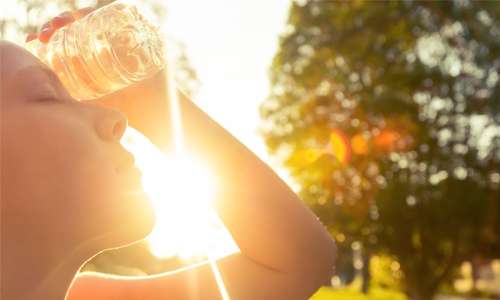A guideline to combat summer heat
Manama : Today the Gulf nations do not look quite the same as they did 60 years before. You will discover artificial vegetation, palm trees and hedges all over the place, yet this has not affected the atmosphere of the place, which stays hot and dry consistently. In summer the temperature may ascend to a 50°C – however fortunately almost everything are aerated and cooled these days. But still, strolling in the city in summer may bring about heat stroke, which can be lethal.
The scorching heat can be fatal to those working outside and especially during the holy month of Ramadan. Health issues that individuals for the most part experience amid fasting period includes heart burn, indigestion, migraine or headache, dehydration, heat stroke, exhaustion and cramps because of the unfavourable climate. Dominant part of the general population who experience the ill effects of some of these heat related sicknesses, particularly amid Ramadan, are open air labourers which is the reason why it is critical for them to remain indoor when temperature is high.
Even to the everyday worker, undergoing certain precautions can be both healthy and safe during this summer where the temperature is at one of its highest.
•If possible, during the hottest hours of the day stay indoors. Avoid the peak summer hours, that is from 11am-3pm as the sunlight is at its harshest then.
•Dressing lightly, especially in airy breathable clothes help to keep your body heat down.
•The most important precaution everyone must follow is to keep one from getting dehydrated. You lose a lot of fluids from your body during this period and thus replenishing yourself regularly is recommended, 3-4 Litres of water can be consumed daily to avoid dehydration and other ailments that follow during this particular season.
•Never leave people or pets inside your cars while you run an errand. Children and pets are both very susceptible to death inside a hot car so if an emergency take them with you or at least leave the window open. Under this hot climate, the inside of a vehicle is as good as the inside of an oven.
•Avoid drinking any carbonated drinks or caffeine during the summer as these drinks do not actually quench your thirst and instead leaves your body parched.
•If using a fan, make sure the wind blows opposite the direction of a window and not along it to ensure that hot air isn’t pushed inside the room.
Some signs that the outside heat is affecting you are if you’re having a hard time breathing, if you’re mouth is dry, if you feel dizzy or faint, getting a pale complexion suddenly, nausea or vomiting etc. These signs should not be ignored if foreseen ahead and the person should get away from the heat and drink sufficient fluids and cool their body down, if that doesn’t help get the required medical attention. If encountered with someone undergoing a heat stroke it’s vital that you call for an ambulance and get them to a hospital without delay. A sign to look out for is whether the person’s undergoing extreme body temperature, i.e. above 102°F, if the person is feeling dizzy or has a headache that is throbbing, a rapidly strong pulse, red skin that is both hot and dry to the touch are all indicators for someone under heat stress.
For a more thorough analysis on the precautions to follow DT News had taken the expert opinion of Dr. P. V. Cheriyan, who is the Chief Resident of the Accident & Emergency Department at Salmaniya Medical Complex.
“Regarding the topic, the summer months are soon starting, and the diseases occurring in summer can be collectively called “Heat Stress”- The heat-related illnesses include- Heat edema, Heat rash, heat cramps, heat syncope, heat exhaustion and heat stroke according to varying severity. The precautions to be taken to prevent them are
(1) Keep on drinking plenty of water, at least 8 glasses daily with a little salt.
(2) Avoid energy drinks /drinks with caffeine.
(3) Rescheduling work to coolest part of the day.
(4) Sleep well, take enough rest and treat stomach diseases.
(5) Be clean. Do not apply oil or cream.
(6) Wear light-coloured loose-fitting cotton cloths and cover the head.
(7) Eat healthy meals with less fat.
(8) Acclimatization to heat – progressive daily exercise for 10-14 days for new comers.
Thanks to the Ministry of Labour for the summer work ban from noon to 4 pm during months of July and August since 2007” is what he said.
It’s of the utmost importance that people keep updating themselves on all the necessary precautions to be taken to avoid any fatal accidents or other health related incidents. Whereas following the given steps is a good start there’s much more you can learn if you seek to educate yourself more thoroughly and thus remain fully prepared to meet the deadly heat.
Related Posts


